
The Allman Brothers Band was an American rock band formed in Jacksonville, Florida in 1969 by brothers Duane Allman and Gregg Allman, as well as Dickey Betts, Berry Oakley (bass), Butch Trucks (drums), and Jai Johanny "Jaimoe" Johanson (drums). Subsequently, based in Macon, Georgia, they incorporated elements of blues, jazz and country music and their live shows featured jam band-style improvisation and instrumentals.
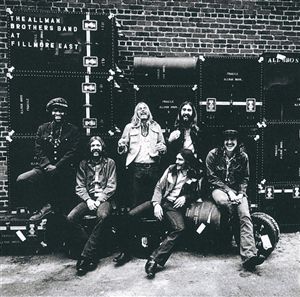
At Fillmore East is the first live album by American rock band the Allman Brothers Band, and their third release overall. Produced by Tom Dowd, the album was released on July 6, 1971, in the United States by Capricorn Records. As the title indicates, the recording took place at the New York City music venue Fillmore East, which was run by concert promoter Bill Graham. It was recorded over the course of three nights in March 1971 and features the band performing extended jam versions of songs such as "Whipping Post", "You Don't Love Me" and "In Memory of Elizabeth Reed". When first commercially released, it was issued as a double LP with just seven songs across four vinyl sides.

Eat a Peach is a 1972 double album by American rock band the Allman Brothers Band, containing a mix of live and studio recordings. Following their artistic and commercial breakthrough with the July 1971 release of the live album At Fillmore East, the Allman Brothers Band got to work on their third studio album. Drug use among the band became an increasing problem, and at least one member underwent rehab for heroin addiction. On October 29, 1971, lead and slide guitarist Duane Allman, group leader and founder, was killed in a motorcycle accident in the band's adopted hometown of Macon, Georgia, making it the final album to feature him.

Gregory LeNoir Allman was an American musician, singer and songwriter. He was known for performing in the Allman Brothers Band. Allman grew up with an interest in rhythm and blues music, and the Allman Brothers Band fused it with rock music, jazz, and country at times. He wrote several of the band's most popular songs, including "Whipping Post", "Melissa", and "Midnight Rider". Allman also had a successful solo career, releasing seven studio albums. He was born and spent much of his childhood in Nashville, Tennessee, before relocating to Daytona Beach, Florida and then Macon, Georgia.

The Allman Brothers Band is the debut studio album by American rock band the Allman Brothers Band. It was released in the United States by Atco Records' subsidiary Capricorn on November 4, 1969, and produced by Adrian Barber. Formed in 1969, the Allman Brothers Band came together following various musical pursuits by each individual member. Guitarist and bandleader Duane Allman moved to Jacksonville, Florida where he led large jam sessions with his new band, one he had envisioned as having two guitarists and two drummers. After rounding out the lineup with the addition of his brother, Gregg Allman, the band moved to Macon, Georgia, where they were to be one of the premiere acts on Capricorn.

Idlewild South is the second studio album by American southern rock band the Allman Brothers Band. Produced by Tom Dowd, the album was released on September 23, 1970 in the United States by Atco Records and Capricorn Records. Following the release of their 1969 debut, the Allman Brothers Band toured the United States extensively to promote the album, which had little commercial success. Their performances, however, did create positive word of mouth exposure that extended to more famous musicians, such as Eric Clapton, who invited group leader Duane Allman to contribute to his 1970 album Layla and Other Assorted Love Songs.
"In Memory of Elizabeth Reed" is an instrumental composition by the American group The Allman Brothers Band. It first appeared on their second studio album, Idlewild South (1970), released on Capricorn Records. The jazz-influenced piece was written by guitarist Dickey Betts, among his first writing credits for the group. Betts named it after a headstone he saw for Elizabeth Jones Reed Napier in Rose Hill Cemetery in the band's hometown of Macon, Georgia. Multiple versions of the composition have been recorded, with the version performed on the group's 1971 live album At Fillmore East generally considered the definitive rendition.
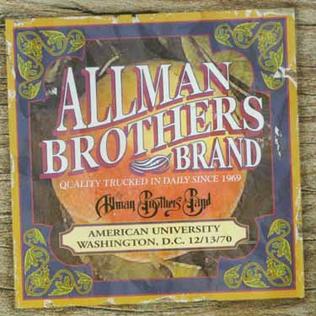
American University 12/13/70 is a live album by the Allman Brothers Band. The first of a series of archival concert recordings from the Allman Brothers Band Recording Company, it features the group's original lineup. It was released in April 2002.

Live at the Atlanta International Pop Festival: July 3 & 5, 1970 is a two-CD live album by the Allman Brothers Band. It features their two performances at the 1970 Atlanta International Pop Festival, at the Middle Georgia Raceway in Byron, Georgia. It was released in 2003.
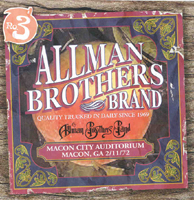
Macon City Auditorium: Macon, GA 2/11/72 is a two-CD live album by the Allman Brothers Band. It was recorded at the Macon City Auditorium in Macon, Georgia on February 11, 1972. The third archival concert album from the Allman Brothers Band Recording Company, it was released in 2004.

Nassau Coliseum: Uniondale, NY: 5/1/73 is a two-CD live album by the Allman Brothers Band. It was recorded at Nassau Coliseum in Uniondale, New York on May 1, 1973. The fourth archival concert release from the Allman Brothers Band Recording Company, it features the 1972 to 1976 lineup of the band – Gregg Allman, Dickey Betts, Chuck Leavell (piano), Lamar Williams (bass), Jaimoe (drums), and Butch Trucks (drums). It was released in 2005.
"Whipping Post" is a song by The Allman Brothers Band. Written by Gregg Allman, the five-minute studio version first appeared on their 1969 debut album The Allman Brothers Band. The song was regularly played live and was the basis for much longer and more intense performances. This was captured in the Allman Brothers' 1971 double live album At Fillmore East, where a 22-minute, 40-second rendition of the song takes up the entire final side. It was this recording that garnered "Whipping Post" spots on both the Rock and Roll Hall of Fame's 500 Songs that Shaped Rock and Roll list and Rolling Stone's list of "The 500 Greatest Songs of All Time", which wrote, "the song is best appreciated in the twenty-three-minute incarnation on At Fillmore East."

Shades of Two Worlds is the tenth studio album by the Allman Brothers Band. Among the tracks are several longer songs of varying genres: the rock song "Nobody Knows"; jazzy instrumental "Kind of Bird"; and the blues-rocker "Get On with Your Life". Dickey Betts wrote or co-wrote five of the eight songs. Newer member Warren Haynes also has co-writing credits on five songs, while namesake Gregg Allman is only credited on two songs. There is also a Delta Blues cover of Robert Johnson's "Come On in My Kitchen".
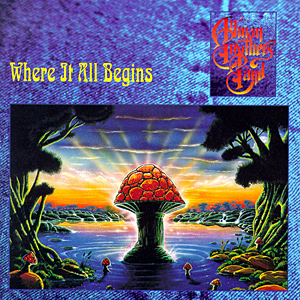
Where It All Begins is the eleventh studio album by the Allman Brothers Band. "No One to Run With" obtained the most album-oriented rock airplay, while "Soulshine", written by Warren Haynes, gained success as a concert and fan favorite. Gregg Allman also started to confront his substance abuse problems in the past on songs such as "All Night Train". The album sold considerably better than its predecessor, Shades of Two Worlds. In 1998, the album went Gold. Nevertheless, critical reception was weaker. This was also the last studio album the group recorded with original guitarist Dickey Betts.
"One Way Out" is a blues song that was recorded in the early 1960s by both Sonny Boy Williamson II and Elmore James. A reworking of the song by G. L. Crockett, titled "It's a Man Down Here", appeared on the Billboard record charts in 1965. In 1971, the Allman Brothers Band recorded an updated live version of the song, which was included on their popular Eat a Peach album (1972).

"Midnight Rider" is a song by the American rock band the Allman Brothers Band. It was the second single from their second studio album, Idlewild South (1970), released on Capricorn Records. The song was primarily written by vocalist Gregg Allman, who first began composing it at a rented cabin outside Macon, Georgia. He enlisted the help of roadie Robert Kim Payne to complete the song's lyrics. He and Payne broke into Capricorn Sound Studios to complete a demo of the song.

Boston Common, 8/17/71 is a live album by the rock group the Allman Brothers Band. As the name suggests, it was recorded at Boston Common in Boston, Massachusetts, on August 17, 1971. It is the fifth archival release by the Allman Brothers Band Recording Company, and the third one to feature the original lineup of the band. It was released in 2007, and re-released in 2014.

Laid Back is the debut solo studio album by American singer-songwriter Gregg Allman, released in October 1973 by Capricorn Records. Allman, best known as the vocalist/lyricist/organist of the Allman Brothers Band, first began considering a solo career after internal disagreements with that group. He developed the album as a small creative outlet wherein he would assume full control, and he co-produced the album alongside Johnny Sandlin. Laid Back was largely recorded in March 1973 at Capricorn Sound Studios in Macon, Georgia, with additional recording and mixing taking place at the Record Plant by Manhattan Recording Engineer, Jim Reeves in New York City.

Play All Night: Live at the Beacon Theatre 1992 is a two-CD live album by the Allman Brothers Band. It was recorded at the Beacon Theatre in New York City on March 10 and 11, 1992. It was released on the Epic/Legacy label on February 18, 2014.
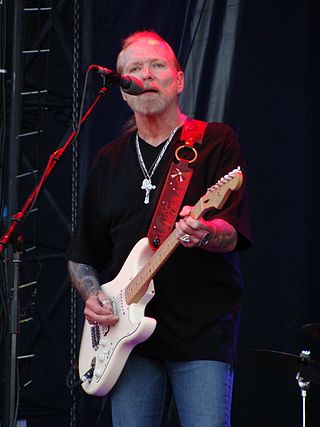
The following is the discography of Gregg Allman, an American singer-songwriter and musician, also including releases from the Gregg Allman Band. Allman released his debut studio album, Laid Back, in 1973; it charted at number 13 on Billboard's Top Pop Albums chart and went gold. His subsequent solo releases, including the live album The Gregg Allman Tour (1974), Playin' Up a Storm (1977), and the collaboration Two the Hard Way (1977) with Cher, did not fare well on charts or in sales. In 1987, he was signed to Epic Records, and his third solo album, I'm No Angel, went gold on the strength of its title track. His next two solo albums, Just Before the Bullets Fly (1988) and Searching for Simplicity (1997), did not perform well. His final studio album released during his lifetime, Low Country Blues (2011), represented his biggest chart positions, including at number five in the US. A posthumous studio album, Southern Blood, was released on September 8, 2017.

















